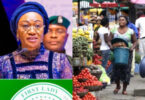To address exploitative pricing practices in the retail sector, the Federal Competition and Consumer Protection Commission (FCCPC) announced on Monday that it is prepared to interact with stakeholders and market leaders throughout Nigeria.... CLICK TO READ THE FULL NEWS HERE▶▶
The FCCPC stated that it has previously required supermarkets to prominently display product pricing to customers.
The program was launched when Nigerians were struggling with inflation, which was made worse by rising food costs and ongoing economic difficulties.
The FCCPC’s Executive Vice Chairman and Chief Executive Officer, Tunji Bello, observed this in a statement, “We have noticed that prices for consumer goods, especially in the retail sector, are frequently disproportionate.”

According to a Premium Times report, the cost burden on customers is further increased because imported goods are usually overpriced, local goods also experience unwarranted price hikes, and market associations have been linked to price fixing.
“While it is recognised that the exchange rate has impacted the value of the Naira, it is, however, observed that prices charged are, in most cases, disproportionate for imported products and excessive for locally produced ones.
“This unfair practice is prevalent in the retail segment of the distribution chain where some market associations are engaged in price fixing at the expense of consumers,” it read. T
The FCCPC stated that it intends to collaborate closely with industry leaders to promote fair pricing practices in order to allay these worries.
According to the commission, its goals are to prevent unfair consumer burdens and minimize excessive profiteering, especially during hard times.
It stated that this endeavour is in line with President Bola Tinubu’s reaffirmed hope agenda, which aims to improve economic stability and consumer protection.
In order to ensure openness, the FCCPC stated that it has previously required supermarkets to prominently display product pricing to customers, guaranteeing that they are aware of expenses prior to making a purchase.
By preventing circumstances when prices are only disclosed at the point of sale, this approach aims to advance more equitable business practices. Nigeria’s annual inflation rate increased in June, hitting 34.19 percent, for the fifth consecutive month.
Notably, from June 2023, when it was 25.25 percent, the food inflation rate dramatically increased to 40.87 percent year over year, a 15.62 percentage point increase.











